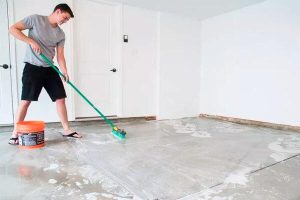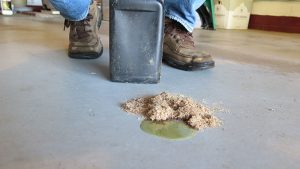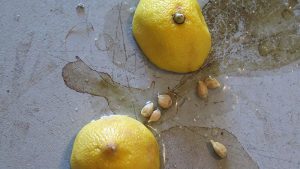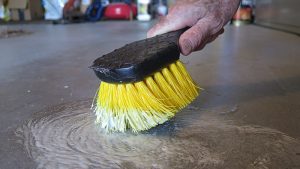Concrete floorings are as durable and stain-resistant as many homeowners believe. Thick liquids like oil and chemical can quickly penetrate the concrete surface to leave a permanent mark. Water spilled on the clean floor can easily seep into the surface to create moisture. This can become a nightmare for garage owners with expensive ceramic tiles.
The only option is to keep your garage clean and maintained. Cleanliness is vital to keep your garage floor new at all times.
It gets harder to remove debris, dust, and fuel spills from the garage floor after they have dried out; hence it’s a great idea to give your garage floor a thorough wash every week. You can apply solid detergents and pressure washer methods to remove the permanent stain or debris if they don’t seem to come off with a regular wash!
Step by Step Method to Clean Garage Floor
Table of Contents
Here is a complete guide to clean the garage floor.
Prepare your Garage
Before you start, don’t forget to prepare the area for cleaning. Tidying the garage is often a part of garage floor cleaning.
Remove Objects
Remove every object from the floor. Start by removing large items such as vehicles, basins, lawnmowers, boxes, etc. Next, you can pick up small items such as screws, tools, etc. Be careful about using a vacuum cleaner in the garage; use a sweeper instead.
Protect Outlets and Drywall
The drywall inside the garage is prone to water damage. Mold and mildew can quickly grow on walls with soaked-in moisture.
Cover at least 2-ft of the drywall with a tarp or plastic. Cover the electrical outlets along the wall.
Remove Stain

Once you’ve removed objects and secured the drywall, it’s time to determine the stain type.
A soap water solution works best in most garage floor cleaning, but it might not fare well against strong stains that of chemical spills, hot tire marks, and kitty litter.
Here are some proven methods to remove stains permanently.
How to remove oil and grease stains?
The occasional oil spill is inevitable in a garage. Every fuel-powered engine spills oil, including a car, bike, generator, and lawnmower. Over time, the oil spill can turn into a thick and stubborn stain that won’t easily come off with detergent.
Here is how you can effectively remove oil and grease:
For Fresh Oil Spill

- Start with sprinkling some sawdust or cat litter over the spill to absorb the liquid. Sweep it up and dispose of it properly.
- Next, pour some dry dish soap onto the stain and let it sit for an hour. Pour some water over it and start scrubbing with a nylon-bristle brush (Avoid using a metal brush). Let the solution rest for a while before scrubbing again.
- Rinse the floor with a power jet wand and remove the liquid with a cloth.
For Old Oil and Grease Stain
- Use natural acid to remove the stubborn stain. You can use lemon juice or vinegar to work on the stain. Pour white vinegar or squeeze lemon onto the stain and let it sit for five minutes.
- Use a stiff brush to scrub and scour the stain.
- Rinse the floor with water. If you still find traces of debris, consider giving it a second scrub with natural acid.
How to Remove Rust Marks?
Rust marks are often left by old machinery, metal parts, garden tools, and metal buckets when left alone for a long time. Moisture is one of the biggest foes of metal that can lead to rusting.
The stain mark won’t leave the concrete floor quickly. It requires an intense clean for the garage floor. You can depend on the natural acid (lemon or white vinegar) and muriatic acid to remove the stain.

- Pour the solution directly onto the stain and let it sit for 10 minutes. Use a nylon brush to work on the stain and then rinse the floor with water.
- Repeat the step if the traces of rust are still visible.
- As an option, you can also use laundry detergent or baking soda and water solution as the rust stain remover. Let the solution sit on the stain for a while before scrubbing it.
How to Remove Sealer and Old Paint Colors?

Paint and sealer stains are the toughest. The industrial paint sticks to the floor surface and leaves a nasty mark.
- Start with a putty knife to scrape off loose paint and then sweep the area.
- Make a Trisodium Phosphate (TSP) and water solution and carefully pout it onto the spot. Let it sit for a while before scrubbing it.
- Rinse with water. You can scrape off the remaining bits using a putty knife.
- As an option, you can use a commercial paint stripper to remove tough paint marks. Let the solution sit on the stain for several hours before scraping and scrubbing.
- A floor grinder is also effective at removing sealers and old paint. You can rent one from your local hardware store. Use a particular grind head that will remove paint, mastic, and sealer.
How to Deep Clean Garage Floor?
The garage floor should be deep cleaned every four or six months, depending on the dirt accumulated on the floor.
- Start with assembling the tools; detergent, degreaser warm water, push broom, power washer, and a buffer.
- Start with making a solution of detergent and warm water. Fill a bucket with warm water, and then add one-third of a cup of detergent. For tough stains, you can use a degreaser.
- Use a broom to give the floor a thorough wash. Allow the solution to sit for about 10 minutes before using a push broom to scrub the entire area. Start at the farthest part of the garage and work your way towards the exit.
- Next, you can use a garden hose to rinse the area. As an option, you can use water and a broom to sweep the area of water.
- For a tough spot, apply a degreaser and then rinse the floor with a power washer. Let the degreaser sit for 15 minutes before applying the power washer. Move the nozzle using broad strokes as you go along the floor.
- Finish the deep cleaning with a floor buffer. It’s highly effective in restoring concrete garage floors. If you don’t have one, you can rent one with a nylon scrubber from the local hardware. Apply cleaning solution on the floor and then start buffering.
How to Clean Epoxy Floor?
Epoxy is a type of garage floor coatings composed of hardeners and resins applied to protect the garage floors. It provides a tough exterior to the garage floors. You can install different epoxy floorings, including epoxy mortar floor, epoxy flake floor, self-leveling epoxy paint, and anti-static epoxy floor.
- Cleaning epoxy floors doesn’t require heavy-duty cleaners because it doesn’t stain often.
- Start with sweeping the floor using a dust mop. You can also use a microfiber cloth to wipe the dirt.
- Use ammonia, water, and a foam or sponge to scrub the floor. Fill a bucket of 1-gallon hot water and half a cup of ammonia. Mix it well before applying it to the floor.
- Use a floor squeegee or a towel to dry the floor.
- To remove the tire, oil, and paint, you can all-purpose cleaner. Mix the solution well and apply it to the floor. Scrub the area using a sponge mop, and then wash it.
FAQs
What cleaners to avoid on epoxy floors?
Epoxy floors are unlike concrete floors. It would be best if you were careful about using heavy-duty cleaner or acid on epoxy. Here is the list of cleaners that you should avoid.
Natural acid
Natural acid includes lemon, oranges, and white vinegar. You should avoid using these items on the epoxy floor. The natural acid easily de-gloss the epoxy floor, leaving a dull mark on the surface.
Soap
Use soap-free cleaners on epoxy floors. The film soap makes the epoxy floor slippery.
Difference between power washer and pressure washer
Many people confuse between power washers and pressure washers. A pressure washer is a cold water unit, while a power washer is a hot water unit.
Power washers rely on the heating coil in the unit to heat the water. It can effectively clean the floor off of oils and grease. A pressure washer is used in most conditions to rinse the entire floor of dirt, stain, detergent solutions, soap, etc.
Use a pressure washer with a minimum rating of 3,000 PSI and a water flow rate of 3 GPM to clean the garage flooring.
Note: Pressure washers and power washers can cause physical harm if handled poorly. The high PSI pressure can rip the human skin; hence don’t forget to wear protective gear before using the washer.
Can I use kitty litter for removing oil stains?
You may be surprised, but you can use kitty litter to remove oil stains from the garage floor. Kitty litter is highly absorbent and can help remove tough oil stains without using any chemical,
You’d need clay-based litter for the purpose. Spread it generously over the stain and leave it overnight. Sweep the entire floor the following day.
How to make a homemade concrete cleaning solution?
For most regular cleaning, you can use baking soda, soapy water, and detergent water. For tough stains, you can use citric acid (lemon) and white vinegar.
Depending on the stain type, you can make a cleaning solution and leave it to the stain for a while before giving it a thorough scrub. Use warm water and detergent solution for tough oil stains and rust stains.
How to prevent garage floor stains?
The best preventive measures to clean garage floor stain are garage floor coatings. You can use epoxy coating, rubber tiles, latex paints, concrete stain maintenance, vinyl flooring, and concrete sealers to protect your garage floor from future stains.